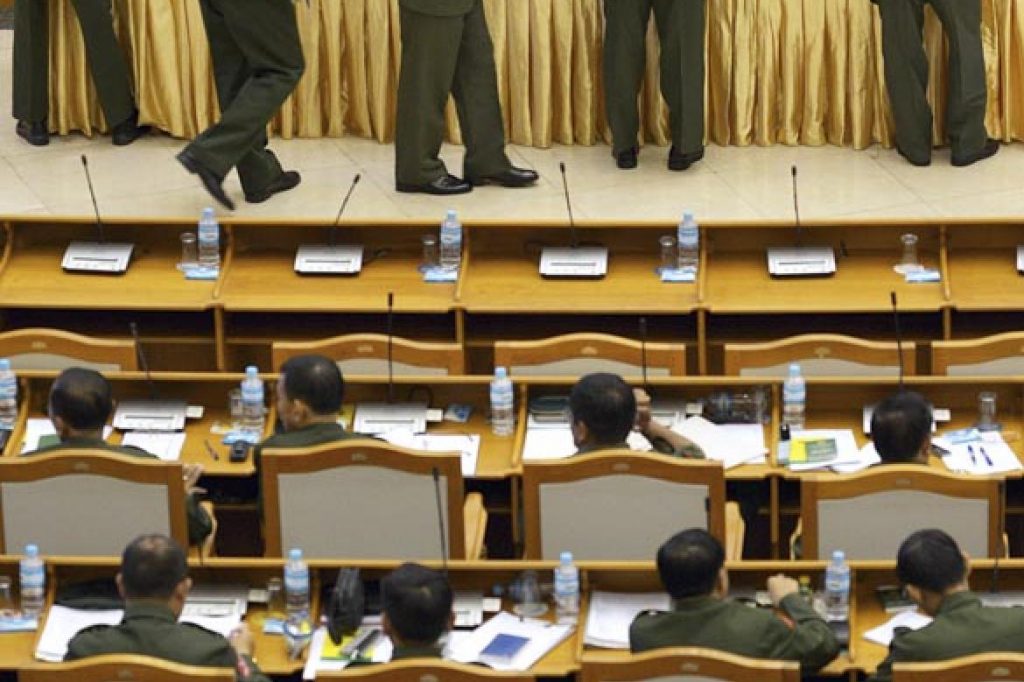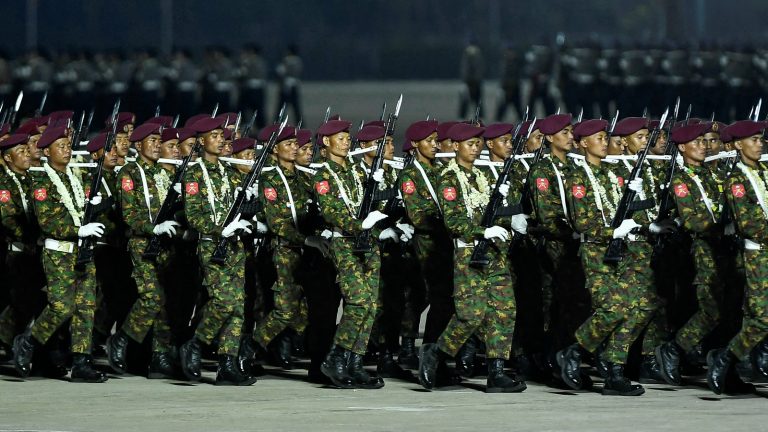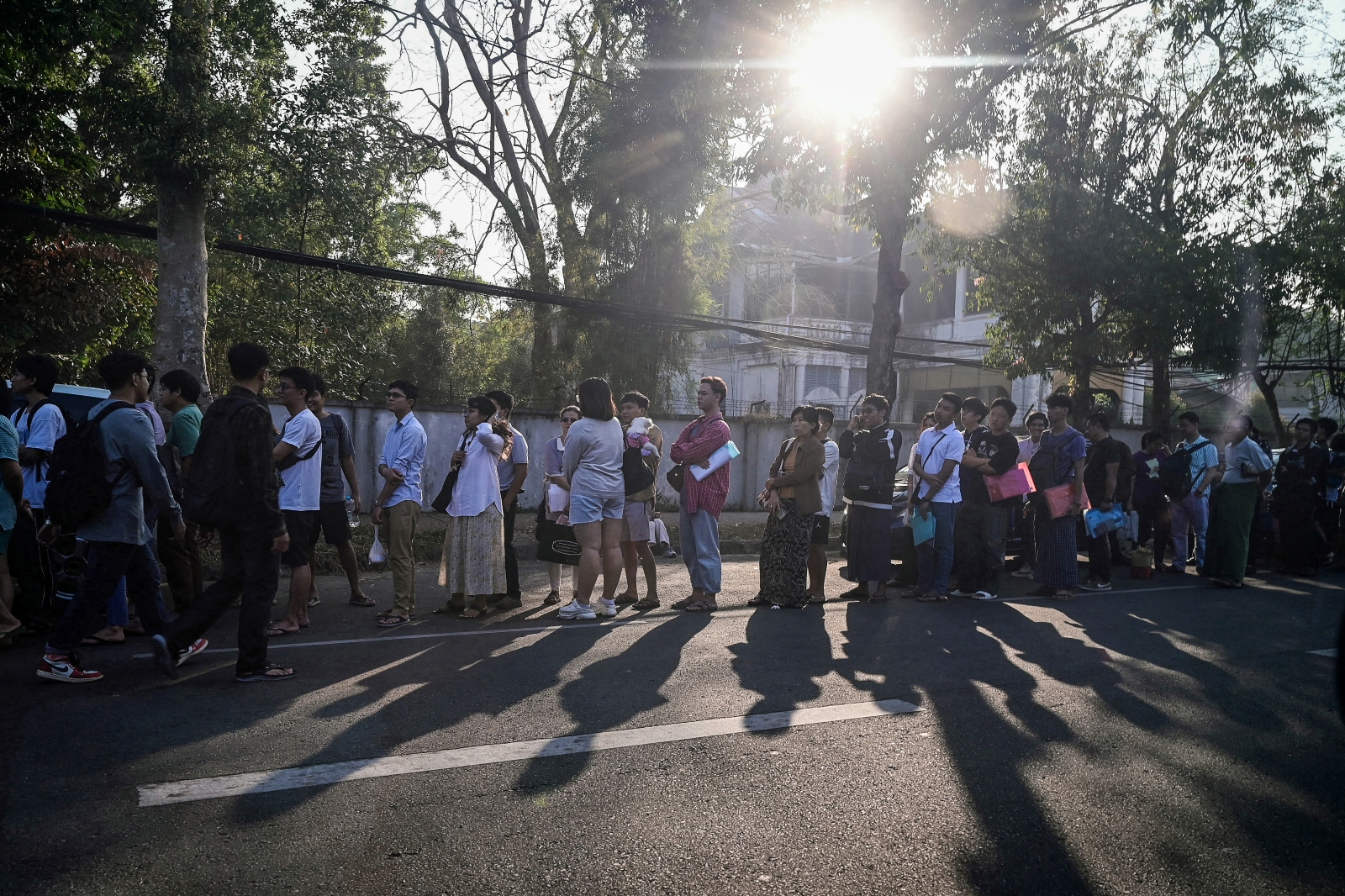Constitutional provisions guarding the Tatmadaw’s interests and a militarized bureaucracy will be among the many challenges facing the country’s next government if democratic parties triumph in the election.
People concerned about Myanmar’s democratic future want the general election next month to be a crucial turning point for the country. Those who are familiar with Myanmar’s well-entrenched power system question whether dramatic change is possible, even with the most optimal of electoral results.
The institutional framework will remain in place after November 8. All the institutions – such as President U Thein Sein’s cabinet, the hluttaws and the Tatmadaw – arise from the 2008 junta-drafted constitution.
What the charter says
According to Section 232b.ii of the 2008 Constitution, whoever becomes president – including Nobel laureate Daw Aung San Suu Kyi if she was to assume the presidency through some miracle – has to appoint high-ranking military officers, nominated by the Commander-in-Chief, to three ministries – Defence, Home Affairs, and Border Affairs.
All the law-enforcement mechanisms, except the judiciary, are controlled by these ministries. The police force, the General Administration Department – which has the authority to appoint village, township and district level administrators – and even the Corrections Department [the prisons] are under the Ministry of Home Affairs. The Ministry of Defence handles all military matters, including the Border Guard Forces.
In theory, the heads of these ministries should be loyal to the President, but in reality, why should they be? They are appointed by the Commander-in-Chief, and their jobs depend on the whims of the Commander-in-Chief, not the President.
Support more independent journalism like this. Sign up to be a Frontier member.
Section 232b.ii basically assures that even if a genuine, elected civilian government emerges from the election, it cannot control the law-enforcement arms without the approval of the Commander-in-Chief.
Section 20b of the chapter on basic principles of the Union is also of interest. This section stipulates: “The Defence Services have the right to independently administer and adjudicate all affairs of the armed forces.” Note the words “independently” and “all affairs”. Nobody understands whether financial affairs are included for administration by the armed forces because the Constitutional Tribunal [the court for constitutional affairs] has yet to provide its interpretation of the clause.
If it includes financial affairs, the new government will face major challenges. It cannot interfere in military-backed business organisations such as the Union of Myanmar Economic Holdings Limited (UMEHL), the Tatmadaw’s controversial conglomerate.
Military-backed business organisations have long been accused of creating serious problems through such practices as land seizures and market monopolisation. If the business organisations commit unlawful acts and the new government cannot rein them in because of section 20 (B) of the constitution, the civil government will be powerless.
Will an elected government be able to set its own budget?
If one group does not depend on government-approved budgets, will it follow the orders of the elected government? The Tatmadaw is such a group, as stipulated by Section (20) (B).
If the elected government cannot interfere with the military in such matters, can it really be called the government?
Shan Nationalities League for Democracy general secretary U Sai Nyunt Lwin said: “Even if the election will be free and fair, if the constitution is not amended the situation won’t change.”
The hluttaws’ 25 percent
If a political party wins a majority of seats in the two hluttaws it does not mean it can control the hluttaws, because elected politicians have no power to amend
the constitution.
Key sections of the constitution protect it from being amended. For example, the controversial clause that gives 25 percent of the Hluttaws’ seats to military MPs appointed by the Commander-in-Chief can be amended only if ‘more than seventy-five percent’ of MPs agree to the amendment. This means a party with a majority of seats could amend the constitution if only one military MP supported the move.
But that is almost impossible. When there was an attempt to amend the constitution earlier this year, military MPs agreed only to a minor change. It was to amend a minor clause in Section 59, which stated that the qualifications of the President and Vice-Presidents include that they “shall be well acquainted with the affairs of the Union such as political, administrative, economic and military.” The military MPs agreed to change ‘military’ to ‘defence’.
Even if members of a political party comprise the cabinet and a majority of the Hluttaws, they cannot amend the constitution without the approval of the Commander-in-Chief.
U Sai Nyunt Lwin said any attempt to amend the constitution “by the Hluttaw way” was likely to be impossible, but it could be amended “the political way which is outside of the Hluttaw.”
He said amending the constitution outside parliament would require an inclusive reconciliation meeting attended by all stakeholders, including the military, to find a negotiated solution. Agreements reached at the meeting would be the basis for amendments to the constitution.
Militarised bureaucracy
Almost all government departments are staffed by retired military officers, former captains, lieutenant colonels and colonels. They continue to be appointed and they take all managerial positions, from assistant manager to managing director. These retired military officers no doubt consider themselves to be beneficiaries of their mother organisation, the Tatmadaw.
If the new government is to be non-military – unlike U Thein Sein’s administration, which is comprised almost entirely of former generals-cum-ministers – it will be difficult for it to administer the bureaucrats. The language of non-military ministers and bureaucrats with a military background is different. Also, soldiers are used to discipline, orders and obedience, instead of dialogue.
The militarisation of the country’s bureaucratic machinery was entrenched by the junta many years ago. No government can function smoothly if its bureaucracy is unmanageable. The incoming government may face difficulties in this respect.
“Even if Daw Aung San Suu Kyi can lead the country, and a civilian government gets the power, they won’t get the real power,” U Sai Nyunt Lwin said.
There have been many calls for the 2015 general election to be free and fair. If we are truly concerned about Myanmar’s future, we must have a long-term view of the post-election era. The big question resonating in our minds is whether the next elected government will have the power to rule that was handed to it by the people







